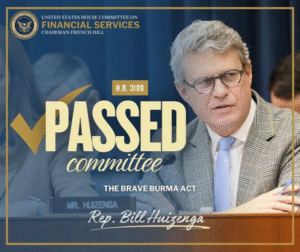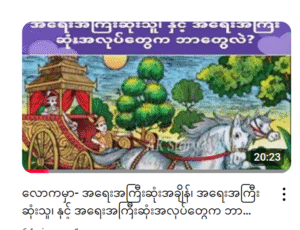In defense of Myanmar’s National Unity Government
A National Unity Government (NUG) rally in Yangon’s Sanchaung Township after it was established as the democratic alternative to military rule following the coup on Feb. 1, 2021. (Credit: DVB)
Guest contributor
James Shwe
Four years into Myanmar’s Spring Revolution, the National Unity Government (NUG) stands as the most successful and legitimate force for democracy the country has ever known.
With control over most of Myanmar’s territory and the overwhelming support of its people, the NUG has achieved what once seemed impossible: uniting a historically fragmented opposition and pushing the military junta to the brink.
Yet today, the revolution faces a grave internal threat—not from the bullets of the junta, but from the corrosive power of relentless negative criticism and division.
If we allow ourselves to drag the NUG down, to render it ineffective through constant attacks and infighting, we risk undoing everything the people of Myanmar have fought and sacrificed for.
The junta’s international lobbying and disinformation
As the junta loses ground at home, it is shifting its fight to the international arena. With the backing of powerful economic interests and foreign partners—especially China—the military is lobbying for premature peace negotiations and sham elections designed to cement its power while it still has leverage.
Sophisticated PR campaigns, international lobbyists, and even some professional activists in Washington, DC, are being used to push this narrative.
Tragically, some Myanmar diaspora activists—often motivated by self-promotion or lacking deep political experience—have been unwittingly drawn into these efforts, helping to amplify the junta’s message and undermine the resistance’s unity.
Warning: Not every call for “peace,” “dialogue,” or “elections” serves the people. Supporting these efforts before the military’s power is truly broken risks legitimizing dictatorship and betraying the revolution’s core principles.
Why criticism of the NUG must be constructive
Some critics accuse the NUG of taking credit for the battlefield victories of Ethnic Resistance Organizations (EROs). This is a misunderstanding of how revolutions succeed.
While EROs and local defense forces are the ones making sacrifices on the ground, the NUG has been instrumental in creating the conditions for their success—providing political legitimacy, coordination, resources, and a unifying vision.
Without this framework, the resistance would remain fragmented and ineffective, as it was in past uprisings.
The NUG is not perfect. It has faced legitimate criticism over inclusivity, responsiveness, and internal politics.
But the answer is reform and accountability—not tearing down the only government capable of uniting the movement and representing Myanmar internationally.
The consequences of dragging down the NUG
If we allow negative criticism, misinformation, and internal division to drag the NUG down, the consequences will be dire:
- Fragmentation: The resistance will splinter into competing factions, making it easier for the military to divide and conquer.
- Loss of International Support: Without a unified, legitimate representative, the international community will hesitate to engage, and the junta’s lobbying efforts will gain traction.
- Legitimizing the Junta: Premature negotiations or sham elections will give the military the “normalcy” it craves, sidelining the democratic movement.
- Betrayal of Sacrifice: The countless lives lost and sacrifices made by the people will be in vain if the revolution collapses from within.
The danger of disinformation
The junta’s propaganda machine is sophisticated, but disinformation and spin can also come from within our own ranks.
Some leaders and organizers, driven by personal ambition, may distort facts or promote divisive narratives for political gain.
We must be vigilant, question all information, and make decisions only after careful, collective thought.
Building a culture of critical, thoughtful engagement
To safeguard the revolution, we must foster a culture of open, respectful, and thoughtful political discussion. This means:
- Engaging in critical thinking: Questioning information, seeking multiple perspectives, and resisting snap judgments.
- Deliberating before deciding: Weighing evidence and considering long-term consequences.
- Holding all leaders accountable: Demanding transparency and honesty from everyone.
- Channeling criticism constructively: Focusing on reform and improvement, not destructive attacks.
The diaspora’s role—and clear countermeasures
The diaspora is vital to the revolution’s success. But it must:
- Scrutinize alliances and advocacy partners—especially those with ties to foreign interests or the junta.
- Demand transparency and accountability from diaspora organizations and leaders.
- Strengthen political literacy and foster informed debate.
- Combat disinformation from all sources, including within our own community.
- Support advocacy that delegitimizes sham elections and premature peace, and that amplifies the NUG and CRPH international legitimacy.
Leveraging international recognition: The IPU and CRPH
A powerful tool in the international arena is the recognition of the Committee Representing Pyidaungsu Hluttaw (CRPH) by the Inter-Parliamentary Union (IPU)—a global organization of national parliaments promoting democracy and cooperation.
The IPU recognition of the CRPH as Myanmar’s legitimate parliamentary interlocutor provides a vital platform to counter the junta’s legitimacy, build parliamentary support worldwide, and coordinate international pressure for real democratic change.
Reform, not ruin—Unity, not division
The NUG is not without flaws, but it remains the only organized, internationally recognized leadership of Myanmar’s resistance. Dismantling the NUG without a clear and credible successor will not lead to a stronger or better government,
Instead, it will likely create a power vacuum that could weaken or even destroy the entire resistance movement, leaving it vulnerable to internal divisions, misinformation, and manipulation by foreign interests.
Now, more than ever, we must focus on strengthening and reforming the NUG, supporting the CRPH’s international legitimacy, and building a resilient, informed, and united movement—one that cannot be sidelined by sham elections, premature deals, or the ambitions of those who would trade justice for expediency.
The future of Myanmar’s democracy depends on our ability to stand together, to reform what needs fixing, and to reject the urge to drag down what we have built. The stakes are nothing less than the survival of the revolution itself.
James Shwe is a Myanmar democracy activist in the U.S. and is a member of the advocacy groups Free Myanmar and the Los Angeles Myanmar Movement. He has been trying to organize and motivate the Myanmar diaspora to advocate for democracy in Myanmar.
DVB publishes a diversity of opinions that does not reflect DVB editorial policy. We’d like to hear what you think about this or any of our stories: [email protected]







